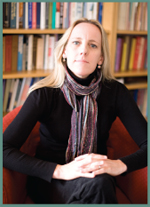We Must Turn to Action to Define our Humanism

IF, AS H.L. MENCKEN SAID, Puritanism is the “haunting fear that someone, somewhere, may be happy,” can we then say that humanism is—or should be—motivated by the haunting fear that someone, somewhere, may be unhappy? That there may be something a humanist might do to help alleviate another’s pain, sorrow, oppression, or misfortune?
Those who seek and attain, with some measure of success, the so-called good life and who espouse a humanist philosophy should certainly be inclined to help other human beings achieve it too. But the narrative is often quite different when religious and otherwise mainstream folks size us up. We’re seen as existential vagabonds, adrift in a morally blank landscape of our own choosing. The humanist label, too quickly associated with the rejection of religion and of supernaturalism, still fails to evoke the ethical framework of our philosophy. We must turn to action to define our humanism. As you’ll see in the pages before you, lots of humanists are doing this already.
I regularly pass people in DC asking for money who appear to be living on the streets. Approaching the escalator down to the subway I often walk by musicians whose open instrument cases invite dollar bills and loose change. College students on summer break may come to my door asking for donations for this cause or another, and then of course there are all the requests that come in the mail or via email and social media. Like most people, I have to make decisions on whom I give to and when. (I lean toward the people living on the street most often.) But is my level of generosity necessarily tied to my worldview? As a humanist, am I (or should I be) more generous than someone who isn’t, given that the pilosophy of humanism suggests a moral imperative to care about the wellbeing of others? How generous am I compared to religious folks?
No doubt you’ve heard findings of previous surveys on how religious people compare to their secular counterparts when it comes to charitable giving. Reputable sources have reported that religious people give more. But their charity is largely directed to their own church or to religious charities. Does where the money goes reflect the level of one’s generosity?
We asked TheHumanist.com readers about their charitable practices, specifically those who receive the Friday email digest of the previous week’s articles (and if you don’t get this, sign up for it!). We wanted to know who they give to or volunteer with, and any other ways they demonstrate generosity in their lives. It was an informal poll, but the 217 responses were enlightening, as Marlena Trafas examines in “Making Good: Humanist Philanthropy and the Duty to Give.” In “How Poverty Kills Wonder and What We Can Do,” Ryan Bell makes the case that addressing the basic material needs of others can’t be ignored, and humanist philanthropist Gordon Gamm describes some of the ways he’s addressed others’ needs, both locally and nationally. From the active volunteers of South Texas Atheists for Reason (STAR) to the myriad efforts of Humanist Service Corps members in Ghana, this issue of the Humanist is devoted to celebrating humanist philanthropy—the good that’s done, without a god.
In the days following the maiming and murder of innocent people in Charlottesville, Virginia, on August 12 by a neo-Nazi who had participated with white supremacists in the ugly “Unite the Right” rally there, Harvard Divinity School Professor of Philosophy Cornel West talked about the national consciousness with CNN’s Anderson Cooper. “I’m not in any way disempowered by the neo-fascist sensibilities of Donald Trump,” he said.
I’ve been seeing it all my life in a variety of different places. I’m more emboldened by the folk who are waking up and shattering the silence, shattering the complacency, shattering the kind of distance and detachment from engagement in struggle around love and justice. And I don’t care whether you’re secular, agnostic, atheistic, Christian like myself, Muslim, Buddhist like bell hooks—we can go on and on. We can come together. We can make a difference. This is the moment for that.
The way to locate the good is through action and solidarity with others of good will. Humanists are doing that. Don’t take my word for it—read the articles in this issue. Better yet, take your own action. The most obvious need right now is for those affected by devastating rains and flooding in Texas. Foundation Beyond Belief is currently raising funds for Hurricane Harvey relief and has designated All Hands Volunteers as its first grant beneficiary. There are also twelve AHA Chapters and Affiliates in the state of Texas–reach out and offer a humanist hand today.
